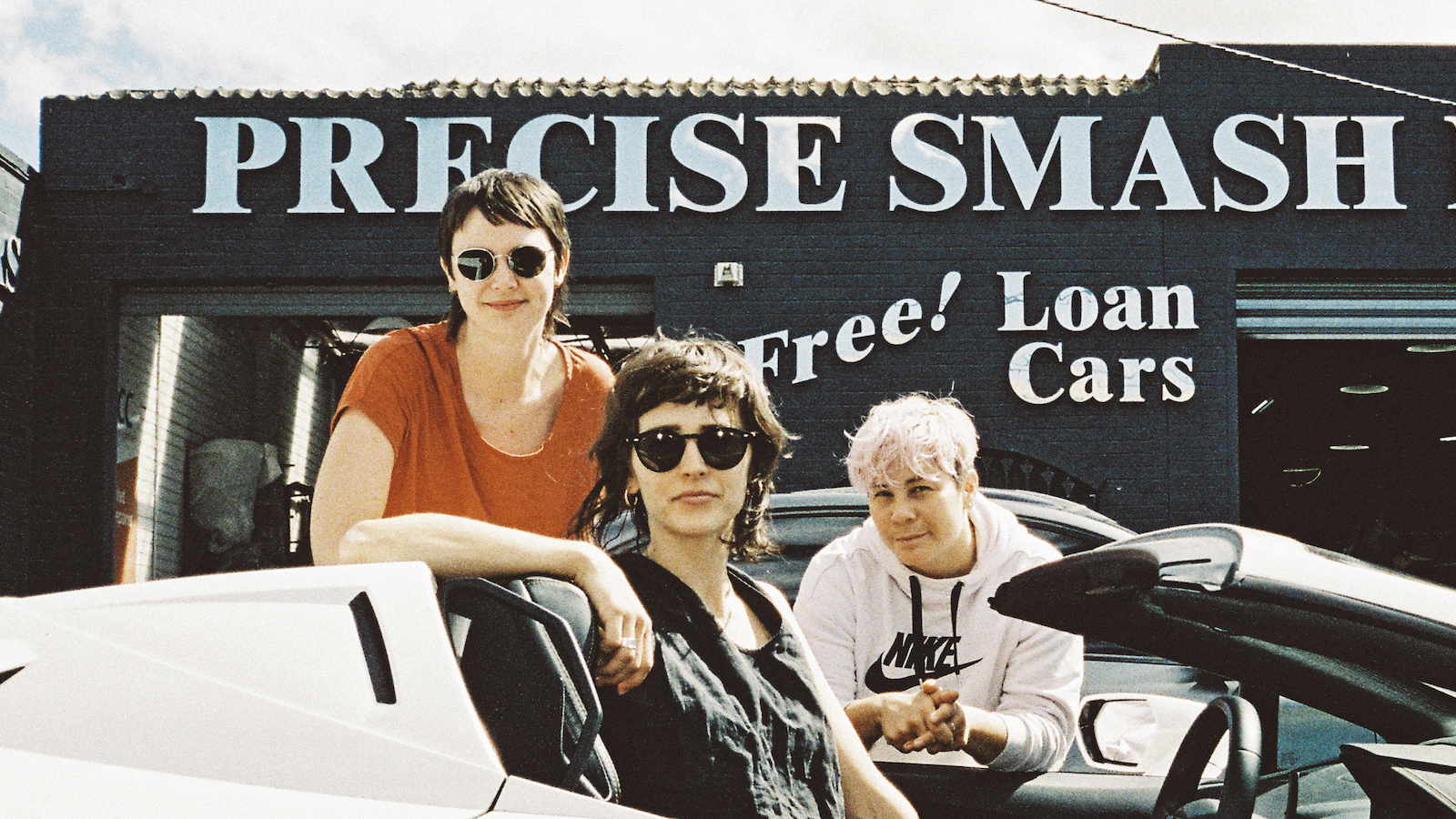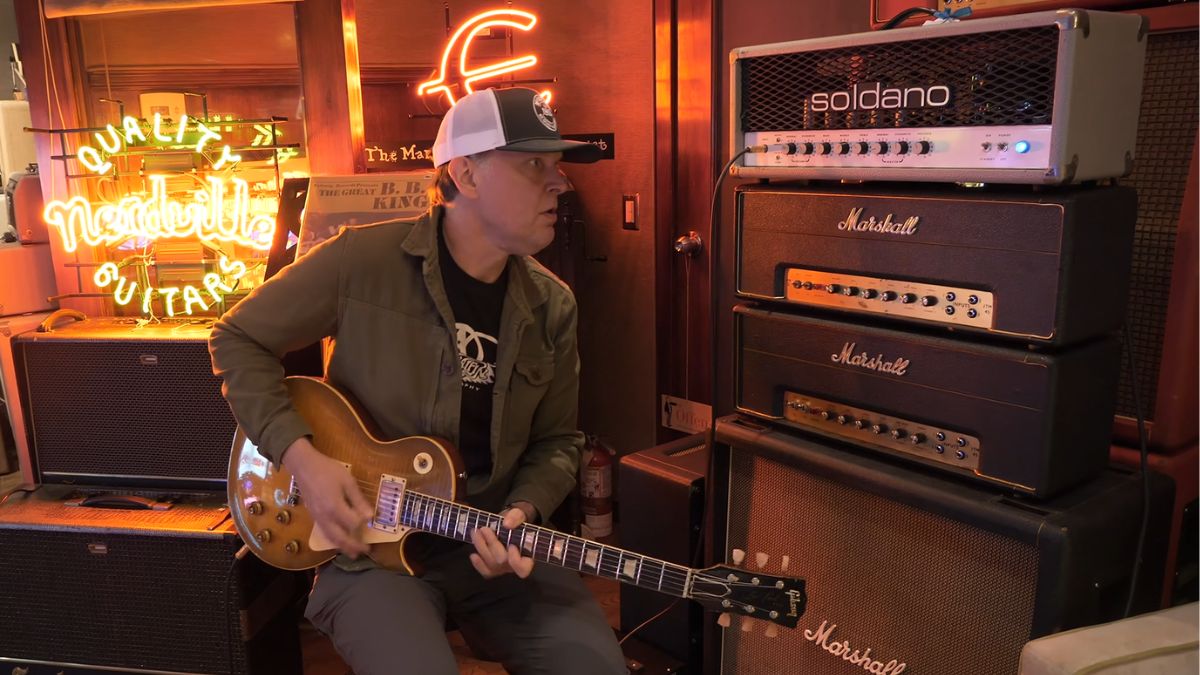Mod Con’s Erica Dunn: “The dynamic is two thirds drinking beer, eating yummy dinners and talking rubbish, and one third making weird songs”
Mod Con frontwoman Erica Dunn riffs on the band’s growth between LP1 and the jaw‑dropping Modern Condition, the gear that went into it, and why it could be compared to a life-altering, psychosis-inducing ice cream…

All the latest guitar news, interviews, lessons, reviews, deals and more, direct to your inbox!
You are now subscribed
Your newsletter sign-up was successful
Politically charged punk-rock is no recent invention, and in the social and cultural climates of 2021, the genre thrives like it never has before – for good reason. It’s easy to see Melbourne trio Mod Con as just one star in an ever-expanding, seemingly infinite galaxy of them… But that doesn’t mean they aren’t incredibly significant. Like any good star, Mod Con burn brightly, explosive and authoritative with their tight and turbulent slivers of fascist-bashing brilliance.
Evermore is that clear on the band’s second album, Modern Condition, fusing punchy P90 juts and belting basslines with an experimental flair that makes each subsequent track more engrossing than the last. It’s the purest distillation of a group whose minds run rampant with creativity – case in point, the band itself is somewhat of a local supergroup, with frontwoman Erica Dunn also in Tropical F*** Storm and Harmony (and wields the solo project Palm Springs), bassist Sara Retallick doubling as Golden Syrup, and drummer Raquel Solier as Various Asses.
Before they hit the road – and then the world – with Modern Condition, we caught up with Dunn to figure out just what it is that makes Mod Con tick, and how this new LP reflects that in the best possible way.
What’s the overall vibe you wanted to get across with this record?
Normally I delegate other people to adjust a vibe. Aesthetics aren’t my strong point, and I never get to be in charge of mood lighting at home and have to leave this important job to my more ambience-aware counterparts. But, if I was like Dennis Denuto in court and pressed about a vibe, I would say that Modern Condition is like a Mr. Whippy van on a hot summer’s day. Sometimes its melodies sound charming, familiar even, like thoughts you’ve already had when you were dreaming, or maybe a late-night conversation you can only remember bits of.
It sounds enticing and lighthearted but when you catch up with it on your bike and get a look at the glossy ice cream pics, instead of delicious, mouthwatering descriptions written in cute bubble text, there are heaps of unnerving questions and weird dystopian suggestions – it’s possible that ice cream just looked at you, even though you didn’t notice it had eyes! You get the feeling that inside that truck, all those ice creams are dancing together. Maybe it’s time you stashed your bike, chucked your phone and your wallet into the closest stormwater drain, and jump onboard!
See, I can’t be trusted with vibe! This answer doesn’t even make sense.
Did you see this record as an opportunity to build on what you’d explored thematically and musically on Modern Convenience?
In the last few years, we have come such a long way on the weird escalator of life, even the tracks from the first album that we still play live have taken on new significance for us. We didn’t necessarily set out to explore a whole new set of themes or a new direction, but this project is based on our triangle of friendship and a conversation that’s constantly ticking over between us. We continue to push each other and challenge each other in all kinds of ways.
All the latest guitar news, interviews, lessons, reviews, deals and more, direct to your inbox!
Since that first record, we have played so many shows together, and this record is representative of that journey. It still has the traits of our musical chemistry – there are elements about it that I feel are getting more refined – and on the flipside, there are parts of it that are melting away and getting distilled into something else. We’re better at making decisions that reflect what we really want. Of course on the back of 2020, there was a new level of gratitude and excitement about even being able to record and hang out together. We were truly delighted to be making a new album.
What is the creative dynamic like between the three of you in Mod Con?
The dynamic is two thirds drinking beer, eating yummy dinners and talking rubbish, and one third making weird songs. In a rough approximation of a creative kind of approach, Raquel [Solier, drums] often writes sections of rhythm based on weird lyrical phrases or sections of melodies that I’ve written. We’ve been playing together for a long time, and I feel like this is an essential part of what we do. The sonorous mid-range of Sara’s [Retallick] bass playing changes where and how I choose to play guitar parts, and her deadpanned vocal approach offsets my sort of screaming-my-head-off. We all have our funny pocket of space, and it fits together like a good Tetris game.
What was the most memorable experience you had in bringing Modern Condition to life?
I absolutely loved our time recording with John Lee at Phaedra. He is a sensitive and interesting soul, and any topic of conversation is on the table. We had many far-reaching chats about all kinds of phenomena, and that curiosity and inquisitiveness fed into the recording process.
There are many memorable moments, but perhaps a weird standout was I when I was putting some guitar overdubs on things and Raquel came by with her daughter after school, and through the glass this lil’ six year old would give me a thumbs-up or -down after each take. She was really psyching me out, but at the same time cracking me up. She was a boss. It was awesome for her to be in there with us, sharing the space.
What guitars were you jamming out on in the studio for this record?
Both guitars on the record, Sara’s bass and my guitar are made by Jon Shub, and they certainly define the sound of the band. My guitar is the same as how Jon made it in 2015, but recently we switched the pickups for some Kent Armstrong noiseless P90s. I f***ing love that guitar. I’ve otherwise used a little Fender Mustang, but, no disrespect to my blue friend, that was really for smashing around on tour.
What about in the way of effects, pedals and other goodies?
For the most part, the pedals that we used are part of my live rig, and we didn’t want to go too far in stretching the sounds in a way that I couldn’t achieve live. The only one we really stepped outside the box with was adding a vintage Ibanez FX unit on a bunch of tracks, to highlight certain parts or to step further outside of Sara’s territory. It was a fun choice, and more interesting than just chucking fuzz or distortion on things.
We tracked all the songs live with the intention of adding guitar overdubs, but for the most part, the best takes were the original ones where I’m reacting to what Sara and Raquel are doing in the room. I think I was also playing more spontaneously when the pressure was off, and I was imagining we were just getting the beds down.

Ellie Robinson is an Australian writer, editor and dog enthusiast with a keen ear for pop-rock and a keen tongue for actual Pop Rocks. Her bylines include music rag staples like NME, BLUNT, Mixdown and, of course, Australian Guitar (where she also serves as Editor-at-Large), but also less expected fare like TV Soap and Snowboarding Australia. Her go-to guitar is a Fender Player Tele, which, controversially, she only picked up after she'd joined the team at Australian Guitar. Before then, Ellie was a keyboardist – thankfully, the AG crew helped her see the light…
